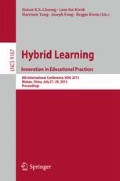Abstract
There have been endless expectations in the potential of social media among academicians when this currently natural phenomenon entered and settled in our professional and private lives. The goal of this paper is to provide readers with an insight into the current trendy issue of social applications in university teaching/learning environment where aspect of real proven collaboration is highlighted. Students’ perspective forms another key aspect of the explored issue. The sub-goal is to compare the results of real active cooperation of students in the social media space with students’ perception of social media potential in the process of education. The paper brings both deep literature reviews on this issue and tangible results gained from series of conducted surveys and follow up semi directed discussions. Findings from the survey do not correspond to great expectations and stressed features of new virtual space and possibilities brought by Web 2.0 phenomenon that would fruitfully foster the process of education.
Access this chapter
Tax calculation will be finalised at checkout
Purchases are for personal use only
References
Valtonen, T., et al.: Net generation at social software: challenging assumptions, clarifying relationships and raising implications for learning. Int. J. Educ. Res. 49, 210–219 (2011)
Cerna, M., Svobodova, L.: Current social media landscape. In: Proceedings of the 10th International Conference Efficiency and Responsibility in Education (ERIE 2013), Prague: CZU, pp. 80–86 (2013)
Greener, S.: How are web 2.0 technologies affecting the academic roles in higher education? a view from the literature. In: Proceedings of the 11the European Conference on e-Learning, (ECEL 2012), Groningen, pp. 124–132 (2012)
Tess, P.A.: The role of social media in higher education classes (real and virtual) – a literature review. Comput. Human Behav. 29, A60–A68 (2013)
Balogh, Z., Turcani, M., Burianova, M.: Modelling web-based educational activities within the combined forms of education with the support of applied informatics. In: Proceedings of the 7th International Conference Efficiency and Responsibility in Education (ERIE 2010), Prague: CZU, pp. 14–24 (2010)
Poulova, P., Simonova, I., Janecka, P.: The use of a software application supporting individual learning styles in e-learning. In: Aplied Computer Science: International Conference, Athens: World Scientific and Engineering Academy and Society, pp. 357–361 (2010)
Agosto, D.E.: Using Social Technologies to Foster Collaboration and Community Building in Face-To-Face Classrooms. https://slis.iu.edu/accreditation/Appendix2.4.php. Accessed 12 December 2014 (2012)
Zach, L., Agosto, D.E.: Using the online learning environment to develop real-life collaboration and knowledge-sharing skills: a theoretical discussion and framework for online course design. MERLOT J. Online Learn. Teach. 5(4), 590–599 (2009)
Cerna, M., Poulova, P.: Social software applications and their role in the process of education from the perspective of university students. In: Proceedings of the 11th European Conference on e-Learning, (ECEL 2012), Groningen, pp. 87–96 (2012)
Schroeder, A., Minocha, S., Schneider, C.: The strengths, weaknesses, opportunities and threats of using social software in higher and further education teaching and learning. J. Comput. Assist. Learn. 26, 159–174 (2010)
Weller, K. et.al.: Social software in academia: three studies on users’ acceptance of web 2.0 services; web science conference 2010, Raleigh, NC. http://journal.webscience.org/360/2/websci10_submission_62.pdf. Accessed 10 April 2014 (2010)
Acknowledgment
The paper is supported by the SPEV Project N. 2108.
Author information
Authors and Affiliations
Corresponding author
Editor information
Editors and Affiliations
Rights and permissions
Copyright information
© 2015 Springer International Publishing Switzerland
About this paper
Cite this paper
Cerna, M. (2015). Potential of Social Media Not Only in Collaborative Learning: Expectations and Reality Case Study. In: Cheung, S., Kwok, Lf., Yang, H., Fong, J., Kwan, R. (eds) Hybrid Learning: Innovation in Educational Practices. ICHL 2015. Lecture Notes in Computer Science(), vol 9167. Springer, Cham. https://doi.org/10.1007/978-3-319-20621-9_11
Download citation
DOI: https://doi.org/10.1007/978-3-319-20621-9_11
Published:
Publisher Name: Springer, Cham
Print ISBN: 978-3-319-20620-2
Online ISBN: 978-3-319-20621-9
eBook Packages: Computer ScienceComputer Science (R0)

